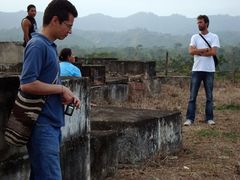
Members of Familiares Colombia, with José Antonio Perez from PBI in Pueblo Bello, where 43 people were massacred.
Walking through Pueblo Bello, years after the massacre which left 43 people dead, it is inevitable that images which are too terrifying and real to contemplate pass through your head. The pain is still tangible in the streets of the town and on the faces of the family members of the victims, like fear frozen in time. In January, PBI accompanied the organisation Familiares Colombia (Family Members in Colombia)1 to the place of the massacre, where a workshop was held to offer psychosocial assistance to the victims in the framework of the measures contemplated in the sentence issued by the Inter-American Court on Human Rights against the Colombian State.
The facts
At the end of 1989 a rumour circulated in the north of Urabá that the guerrilla had stolen 42 cattle from paramilitary boss Fidel Castaño, who believed that the inhabitants of Pueblo Bello were accomplices of the guerrilla. Years later, one of these inhabitants would tell the Inter-American Court that Castaño had declared that «they will pay for those forty-two cattle with forty-two people».2 On 13 January 1990, «Los Tangueros», Castaño´s terrible death squad, began to carry out his threat, taking not 42, but 43 inhabitants of Pueblo Bello, three of whom were minors. The subsequent investigations established that these 43 men were subjected to a horrific interrogation in an attempt to discover the whereabouts of the cattle. According to another witness in the Court, «during the interrogation, some of the hostages had their veins opened, their genital organs were cut off, and their eyes were poked out».3 It is believed that 20 of them did not survive this torture, and that the others were dismembered and buried in shallow graves. To this day not a trace has been found of 37 of the disappeared. When the family members of the disappeared went to the authorities the following day to ask about their loved ones, the response of a certain Lieutenant Rincón was devastating: «When they took Fidel Castaño´s cattle you didn´t come and report it, you have only done so now that they have taken people. It must be revenge; you have exchanged your people for cattle».4
The Inter-American Court Sentence5
Taking into consideration the dissatisfaction of the victims’ family members with the Colombian justice system’s sentencing of a dozen people found guilty of being involved in the massacre (among them Fidel Castaño who is now also disappeared), the Inter-American Commission on Human Rights brought Colombia before the Inter-American Court for the massacre in March 2004. The Commission considered that «the State had not fully fulfilled its obligation to clarify the facts, effectively judge those responsible, and recover the bodies of the remaining victims, » and that what had happened had supposed «an act of private justice at the hands of Castaño´s paramilitary groups, perpetuated with the acquiescence of State officials.»6 In 2006 the Inter-American Court of Human Rights found the Colombian State guilty of the massacre and declared that there was still partial impunity in the case. The sentence also affirmed that the State had created a situation of risk for the town of Pueblo Bello, violating the rights of the victims to life, personal integrity and freedom, and to rights and judicial guarantees for their family members. The Court sentence ordered monetary compensation, a commitment on the part of the government to activate and complete the investigation in a reasonable time frame, the search for and identification of the disappeared people, the handing over of their mortal remains, and guarantees for the security of the inhabitants of PuebloBello and the construction of a monument in memory of the victims. Although the families continue to wait for the State to comprehensively and satisfactorily fulfill the terms of the sentence, thereby adhering to one of the measures ruled on by the Court, the government made a public apology on 4 March, in which defence minister Juan Manuel Santos assumed the State’s responsibility in the massacre with these words: «As defence minister, in the name of the Colombian State, I recognise before you, the family members of the victims, and before the national and international community, the State’s international responsibility.»7
FOOTNOTES
1 Familiares Colombia, organisation of 37 family members of those who were disappeared in the Pueblo Bello massacre
2«La masacre del Pueblo Bello», Fundación Ayuda al Refugiado (FUNAR), 5 March 2009
3 Ibid
4 Ibid.
5 Case of the Pueblo Bello Masscare Vs. Colombia, Inter-American Court of Human Rights, Sentence of 31 January 2006
6 Ibid.
7 «Mindefensa pidió perdón a las víctimas de la masacre de Pueblo Bello», El Espectador, 4 March 2009
